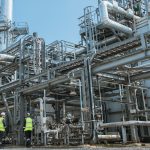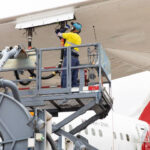In his first public engagement since his coronation, King Charles III has broken ground on the New Whittle Laboratory at the University of Cambridge, a £58 million ($73m) facility aiming to become a leading global centre for net zero aviation and energy. Its mission is to halve the time to develop key technologies to support a sustainable aviation industry. The King met the Laboratory’s staff and researchers, as well as aviation industry and senior government representatives, who gathered for an international roundtable as part of an initiative led by Cambridge and the Massachusetts Institute of Technology. Participating organisations included the UK government, UK Aerospace Technology Institute, the US FAA, NASA, EU Clean Aviation Joint Understanding, Airbus, Boeing, Rolls-Royce and the Sustainable Markets Initiative. The facility will incorporate the Bennett Innovation Laboratory and the UK’s National Centre for Propulsion and Power, built around a fast feedback model pioneered in motor racing’s Formula One.
“We need to completely transform the innovation landscape in the aviation and energy sectors if we are to reach net zero by 2050,” commented Professor Rob Miller, Director of the Whittle Laboratory, which was opened in 1973 by Sir Frank Whittle, a pioneer in the development of modern power and propulsion systems for aircraft. “The New Whittle Laboratory has been designed as a disruptive innovation lab targeting the critical early stages in the lifecycles of technologies, where there are windows of opportunity to translate scientific strengths into global technological and industrial leadership.”
The roundtable shared insights based on global aviation systems modelling capabilities developed through the Aviation Impact Accelerator, a project led by the Whittle Laboratory and the Cambridge Institute for Sustainability Leadership.
Today, reported Miller, it typically takes six to eight years to develop a new technology to a point where it can be considered for commercial deployment in the aerospace and energy sectors, but he said recent trials in the Laboratory had shown this timeframe can be accelerated by breaking down barriers that exist between academia and industry.
“The Lab is designed to work at the intersection of cutting-edge science and emerging engineering applications, providing fast feedback between the two, and dramatically cutting the time to deliver zero-emission technologies,” added Miller.
The Bennett Innovation Laboratory is made possible through a gift from the Peter Bennett Foundation, himself a Cambridge alumnus and philanthropist. “To tackle the most complex challenges, we need to take a whole systems approach, where innovative technologies can be explored within the context of the realities that may impact their roll out. Rigorous testing using models such as the Aviation Impact Accelerator expedites the process of innovation and implementation.
“We need new ways to work together at speed, which is why the Bennett Innovation Lab will bring together global experts from government, industry and academia, enabling radical collaboration. I believe by using Cambridge’s convening power, this can make a real difference fast.”
Attending the event was the UK’s Transport Secretary, Grant Shapps, who said: “The UK is leading a revolution in aviation, looking to new technologies to cut emissions. Having established the Jet Zero Council three years ago by bringing together government, industry and academia, I strongly welcome the Whittle Laboratory being at the forefront of that endeavour today. This will further help the best minds from the fields of energy and aviation push ever-further and faster with the latest innovations in order to solve the problem of environmentally friendly and affordable flying.”
Japan’s Mitsubishi Heavy Industries has had a strategic research partnership with the Laboratory since the 1980s. “We look forward to continuing our relationship over the coming decades and we want our engineers to think of the new Lab as their European home – a unique environment where they can participate in a culture that brings together the best global ideas, expertise, software, tools and testing facilities that can help solve the challenge of climate change.”
The Laboratory also has a long association with aero engine manufacturer Rolls-Royce that has delivered hundreds of technologies into its products, said Rolls-Royce Chief Technology Officer, Grazia Vittadini. “Partnerships like this are critical if the UK is to maintain its role as a science superpower and to create high value jobs in the UK,” she said. “The New Whittle Laboratory offers an exciting opportunity to raise this ambition by bringing together cutting-edge science and engineering application in one building with the aim of meeting the challenge of net zero flight by 2050.”
Also represented at the event was US aeroplane manufacturer Boeing. “Our partnership with the University of Cambridge is central to the effort of making aviation carbon neutral,” said Jim Hileman, VP and Chief Engineer, Sustainability and Future Mobility. “As well as helping us to find technology solutions, it is bringing together different companies and academic disciplines from across the sector to drive change at the system level. We are excited by the way in which the New Whittle Laboratory has been designed to break down silos, bringing together a wide range of disciplines to take on the most challenging net zero aviation problems.”
When Prince of Wales, King Charles visited the Laboratory in 2020 and 2022 to encourage the acceleration of sustainable aviation. He hosted an industry roundtable in 2020 in London with the Sustainable Markets Initiative and the World Economic Forum to explore solutions for decarbonising air travel.
Photo (© University of Cambridge, Lloyd Mann): King Charles at the ground-breaking ceremony for the New Whittle Laboratory















More News & Features
UK government starts new consultation on SAF revenue certainty mechanism
Catagen launches SAF production company and signs offtakes with Ryanair and Shell
Aviation needs better measurement to deliver meaningful decarbonisation
More targeted and faster measures needed to overcome barriers and unlock SAF’s full potential, finds PA study
NATS survey shows a continuing disconnect of public attitudes to the environmental impact of flying
UK government announces grant funding awards totalling £63m to 17 SAF projects